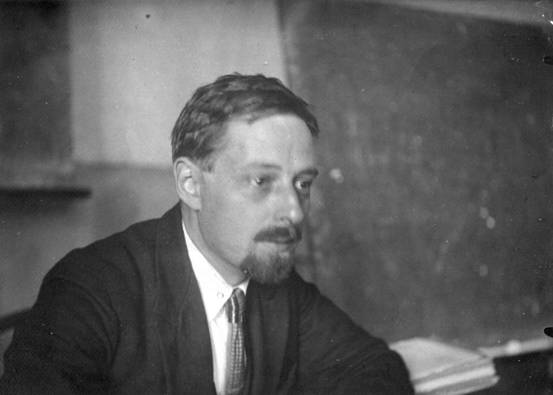
Vladimir Propp
Vladimir Yakovlevich Propp (Russian: Владимир Яковлевич Пропп; 29 April [O.S. 17 April] 1895 – 22 August 1970) was a Soviet folklorist and scholar who analysed the basic structural elements of Russian folk tales to identify their simplest irreducible structural units.
Vladimir Propp
Hermann Waldemar Propp
29 April 1895
St. Petersburg, Russian Empire
22 August 1970 (aged 75)
Leningrad, Russian SFSR, USSR
Biography[edit]
Vladimir Propp was born on 29 April 1895 in Saint Petersburg to an assimilated Russian family of German descent. His parents, Yakov Philippovich Propp and Anna-Elizaveta Fridrikhovna Propp (née Beisel), were Volga German wealthy peasants from Saratov Governorate. He attended Saint Petersburg University (1913–1918), majoring in Russian and German philology.[1] Upon graduation he taught Russian and German at a secondary school and then became a college teacher of German.
His Morphology of the Folktale was published in Russian in 1928. Although it represented a breakthrough in both folkloristics and morphology and influenced Claude Lévi-Strauss and Roland Barthes, it was generally unnoticed in the West until it was translated in 1958. His morphology is used in media education and has been applied to other types of narrative, be it in literature, theatre, film, television series, games, etc., although Propp applied it specifically to the wonder or fairy tale.
In 1932, Propp became a member of Leningrad University (formerly St. Petersburg University) faculty. After 1938, he chaired the Department of Folklore until it became part of the Department of Russian Literature. Propp remained a faculty member until his death in 1970.[1]
His main books are:
He also published some articles, the most important are:
First printed in specialized reviews, they were republished in Folklore and Reality, Leningrad 1976
Two books were published posthumously:
The first book remained unfinished, the second one is the edition of the course he gave in Leningrad university.
Criticism[edit]
Propp's approach has been criticized for its excessive formalism (a major critique of the Soviets). One of the most prominent critics of Propp was structuralist Claude Lévi-Strauss, who, in dialogue with Propp, argued for the superiority of the paradigmatic over syntagmatic approach.[6] Propp responded to this criticism in a sharply-worded rebuttal: he wrote that Lévi-Strauss showed no interest in empirical investigation.[7]